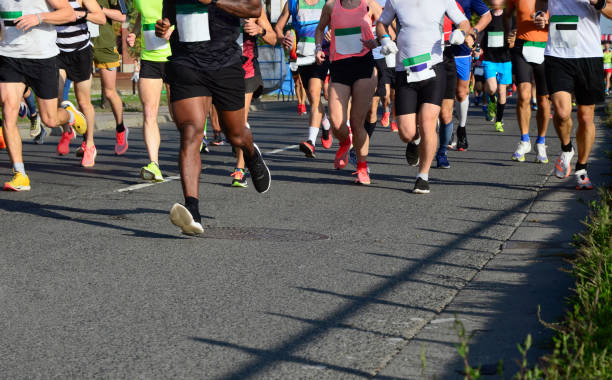
The Marathon Predicting Calculator is a handy tool that estimates your performance across various common race distances based on a previous race you’ve completed.
Let's explore how this calculator works and how you can benefit from using it.
Estimating your marathon time involves several factors, including your current fitness level, training regimen, race conditions, and personal characteristics.
While no prediction can be entirely accurate, runners can use our time predictor calculator to forecast their marathon finish time.
Here's how it works:
Keep in mind that predicted times are estimates and may vary based on factors like race conditions, fitness level, and training consistency.
Use the predicted time as a guide to set realistic goals for your upcoming race. It's essential to consider your current fitness level and any improvements you've made since your last race.
Then, you can use your predicted race time to tailor your training plan to help you reach your goal. Focus on areas where you can improve and track your progress as you prepare for race day.
Consider recent training
If you've been training consistently and have completed long runs, your predicted time may be more accurate.
Factor in terrain and weather conditions
If your upcoming marathon is hilly or the weather conditions are challenging, adjust your prediction accordingly.
Account for tapering
In the weeks leading up to your marathon, you'll likely reduce training volume to rest and recover. Consider how tapering might affect your performance.
Listen to your body
If you're experiencing injuries or fatigue during training, adjust your expectations accordingly.
Remember, these predictions are just estimates. Anything can happen on race day, so focus on doing your best rather than solely chasing a specific time goal.
Here's how you can calculate how fast you will finish half marathon distance.
First, you need to look at your recent 10K or 10-mile race results or your training runs. You need these data to determine your average pace per mile/kilometer.
Then, use our calculator.
Simply input your recent race distance times or training paces to get your predicted half-marathon time.
When setting goals based on your predicted half-marathon time, consider factors like terrain, weather, and your current fitness level.
Remember, while these calculations can give you a rough estimate, they're not guarantees.
Pay attention to how your body feels, and make changes to your training routine as necessary. Remember to enjoy the journey of getting ready for your race!
Certainly, your previous race results can affect your future race time, but it's not the only factor.
Let’s explore some of the key elements that influence how fast you run your next marathon or half marathon.
Proper training is essential. Consistent workouts, long runs, and speed sessions improve endurance and speed.
Your overall fitness, including cardiovascular health and muscle strength, affects performance.
Running in extreme heat, cold, or strong winds can impact your pace. Hot conditions often lead to slower finish times.
Flat courses allow for faster running, while hilly or uneven terrain can slow you down.
Trail races with elevation changes require strategies different from road races.
Dehydration affects performance. Proper hydration and fueling are crucial during longer races.
Nutritional choices impact energy levels and endurance.
Starting too fast can lead to fatigue later. Consistent pacing helps maintain speed.
Drafting behind other runners can reduce air resistance and improve efficiency.
Mental strength plays a role. Staying focused, positive, and determined during challenging moments matters.
Remember that each runner is unique, and individual factors may vary. Train smart, adapt to conditions, and enjoy the journey toward better race times!
Improving your running time involves training, form adjustments, and overall fitness.
Here are some expert tips to help you pick up the pace.
First of all, you need to set clear goals.
Having specific goals you want to hit gives you something to work toward. Whether it’s running a certain distance at a specific time or increasing your cadence (steps per minute), having a target motivates you to push harder during racing.
Then, you need to move on to working on these goals.
One of the great ways to strengthen your endurance and speed is through sprint interval workouts.
Here, you need to alternate between jogging and sprinting. Start with short bursts of speed work and gradually increase the intensity.
Remember to watch your breathing and notice the difference between discomfort and pain. Running outside your comfort zone helps you get accustomed to faster paces and longer distances.
Working on your running form is also a crucial element that will help you improve your race time.
When you run, lean slightly forward. This helps improve your speed and aerodynamics. Focus on pushing off firmly with each foot. Pump your arms actively instead of letting them bounce passively with your body’s rhythm.

When getting ready for the next race, you want to work on strengthening your core and full body as well.
Core exercises like crunches and sit-ups improve overall stability.
Weight training ensures you can maintain proper running form.
A strong body translates to more energy available for faster running.
Mix up your training routine with different types of runs: speed work, tempo runs, and fartleks (unstructured speed play).
Include hill training and stairs to build strength and power.
Of course, don't forget about proper recovery and rest. Allow your body time to recover after intense workouts. Prioritize sleep and nutrition to support your training efforts.
Our Marathon Pace Calculator is a valuable tool that estimates your race performance based on past results.
To use it effectively, consider various factors such as fitness level, training, and race conditions.
Remember that predictions are estimates, and adjustments may be necessary based on individual circumstances.
Setting realistic goals and listening to your body are essential for success.
Certainly, previous race results can influence future performances, but other factors such as training, weather, terrain, nutrition, pacing, and mental toughness also play significant roles.
Have fun and keep running!